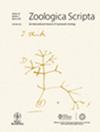新世界珊瑚蛇(蛇类:Elapidae)物种描述中的林奈学缺陷和时空模式
IF 2
2区 生物学
Q2 EVOLUTIONARY BIOLOGY
引用次数: 0
摘要
地球上生命的规模和人类的局限性甚至阻碍了对生物多样性最基本方面的了解,例如居住在地球上的物种身份,即所谓的林奈缺失。评估物种描述日期的模式及其与宏观生态变量的关系有助于指导分类工作的重点。因此,我们旨在评估新大陆珊瑚蛇生物多样性知识中的林奈缺失。我们模拟了物种描述日期,估计约有三分之一的珊瑚蛇多样性仍然未知。未被描述的物种与已被描述的物种在进化上关系密切。此外,最近描述的该类物种的地理分布范围较为有限,而且往往体型较小。亚马逊西部和干旱对角线(即卡廷加、塞拉多和查科)是描述年代最早的地区。然而,这些地区的集合体与其物种的模式产地之间的平均地理距离最大,这表明这些地区的分类工作很少。我们建议将分类学工作分配到干旱对角线地区,并使用综合分类学技术来更好地划分物种,这对于填补林奈学派在新世界珊瑚蛇方面的空白是势在必行的。本文章由计算机程序翻译,如有差异,请以英文原文为准。
Linnean shortfall and space‐time patterns in species description of New World coralsnakes (Serpentes: Elapidae)
The magnitude of life on Earth and human limitations hinder the understanding of even the most basic aspects of biodiversity, such as the identity of species inhabiting the Earth, the so‐called Linnean shortfall. Evaluating patterns in species description dates and their relationship with macroecological variables can help guide where taxonomic efforts should be focused. Therefore, we aim to assess the Linnean shortfall in the knowledge of New World coralsnake biodiversity. We modelled species description dates and estimated that approximately one‐third of the coralsnake diversity remains unknown. The undescribed species are evolutionarily closely related to the already described species. Moreover, recently described species in the group have more restricted geographic ranges and tend to be small‐bodied. The western Amazon and the dry diagonal (i.e. Caatinga, Cerrado, and Chaco) are the areas with the oldest description dates. However, assemblages in these areas have the largest average geographic distances to the type locality of their species, suggesting that little taxonomic effort has been dedicated intrinsically to these regions. We suggest that allocating taxonomic efforts to the dry diagonal and the use of integrative taxonomic techniques for better species delimitation are imperative to fill the Linnean shortfall for the New World coralsnakes.
求助全文
通过发布文献求助,成功后即可免费获取论文全文。
去求助
来源期刊

Zoologica Scripta
生物-动物学
CiteScore
5.60
自引率
0.00%
发文量
52
审稿时长
>12 weeks
期刊介绍:
Zoologica Scripta publishes papers in animal systematics and phylogeny, i.e. studies of evolutionary relationships among taxa, and the origin and evolution of biological diversity. Papers can also deal with ecological interactions and geographic distributions (phylogeography) if the results are placed in a wider phylogenetic/systematic/evolutionary context. Zoologica Scripta encourages papers on the development of methods for all aspects of phylogenetic inference and biological nomenclature/classification.
Articles published in Zoologica Scripta must be original and present either theoretical or empirical studies of interest to a broad audience in systematics and phylogeny. Purely taxonomic papers, like species descriptions without being placed in a wider systematic/phylogenetic context, will not be considered.
 求助内容:
求助内容: 应助结果提醒方式:
应助结果提醒方式:


